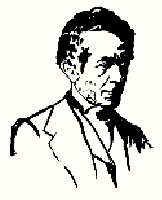Strauss, David Friedrich
Strauss, David Friedrich
Copyright © 2025 bible.booksAI.org - All rights reserved)

Strauss, David Friedrich
Strauss was a major voice in prompting and articulating the scholarly, detailed study of the historical Jesus, which has gone on for more than a century and a half since the publication of his seminal work Das Leben Jesu kritisch bearbeitet (The Life of Jesus Critically Examined) in 1836. Many of the points he makes in this work are still part of the ongoing Jesus-of-history debate. The intense attention he paid to the actual Gospel texts is a model of studiousness.
In the course of his long (3-chapters) and mainly sympathetic assessment of Strauss' life and work, Albert Schweitzer describes him as "not the greatest, nor the deepest, of theologians, but the most absolutely sincere." Regarding Strauss' general world-view, Peter Hodgson characterises him as "the first of the modern unhappy lovers of Christian theology... not quite atheist, but unable to believe in a personal God who intervenes in the course of nature and history..." (introduction to the 1973 re-edition of Strauss's Life of Jesus, p. xv).
In place of orthodox theism, Strauss posited a pantheism that asserted the ultimate identity of God and the world and the immanence of time and eternity. He is utterly unwilling to consider any of the miracle stories as having literally occurred, and consistently seeks a rationalist explanation for the episodes narrated by the Evangelists. Rejecting both the supernatural God-man of orthodox faith, and the idea of Jesus as a prophetic preacher imbued with eschatological imagery, Strauss wrote his destructive critique of the historicist interpretation of Jesus, intending�he says�to detach the essence of faith from the religious imagery with which it had been entangled. In effect, he created his own image of what the historical Jesus may or must have been like.
Reading Strauss allows one to better understand the thought-world from which in the early 20th century Rudolf Bultmann launched his attempt to demytholise the Gospels. While this project has prompted many imitators over the intervening generations, to Strauss must go the credit of having been the first to articulate in such detail the impossibility of reconstructing from the manifold elements in our Gospels a single, convincing and coherent picture of the historical Jesus of Nazareth. His historical scepticism set much of the agenda for Gospel scholarship in succeeding generations, especially in his native Germany, and many of the problems he highlighted still pose a challenge to interpreters today.
Copyright © 2025 bible.booksAI.org - All rights reserved)